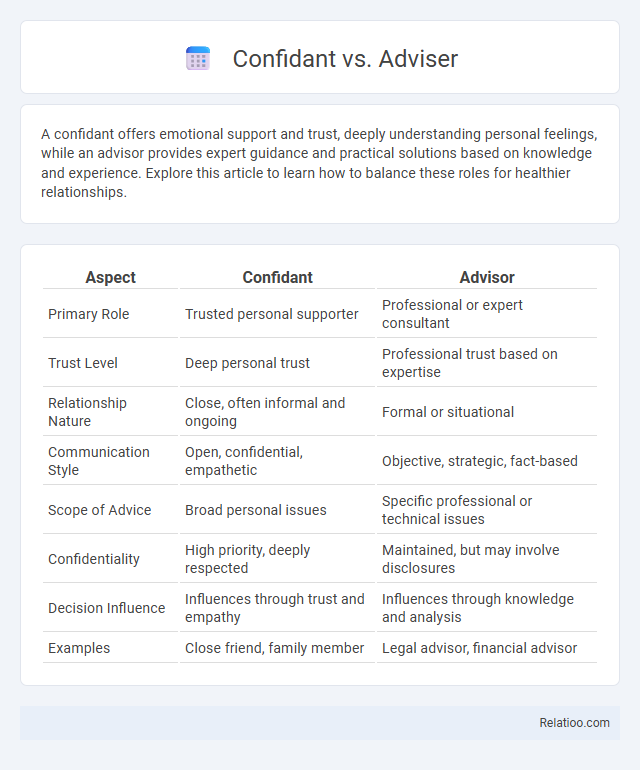A confidant offers emotional support and trust, deeply understanding personal feelings, while an advisor provides expert guidance and practical solutions based on knowledge and experience. Explore this article to learn how to balance these roles for healthier relationships.
Table of Comparison
| Aspect | Confidant | Advisor |
|---|---|---|
| Primary Role | Trusted personal supporter | Professional or expert consultant |
| Trust Level | Deep personal trust | Professional trust based on expertise |
| Relationship Nature | Close, often informal and ongoing | Formal or situational |
| Communication Style | Open, confidential, empathetic | Objective, strategic, fact-based |
| Scope of Advice | Broad personal issues | Specific professional or technical issues |
| Confidentiality | High priority, deeply respected | Maintained, but may involve disclosures |
| Decision Influence | Influences through trust and empathy | Influences through knowledge and analysis |
| Examples | Close friend, family member | Legal advisor, financial advisor |
Understanding the Roles: Confidant vs Advisor
A confidant serves as a trusted person with whom one shares personal thoughts and emotions, offering emotional support and discretion. An advisor provides expertise and guidance on specific issues, typically related to professional or strategic matters, emphasizing objective analysis and problem-solving. Understanding the distinction between a confidant's empathetic role and an advisor's consultative function is essential for leveraging their unique benefits effectively.
Key Differences Between a Confidant and an Advisor
A confidant offers personal trust, emotional support, and discretion, often sharing intimate thoughts and feelings, whereas an advisor provides expert guidance, strategic advice, and professional expertise on specific matters. Confidants prioritize confidentiality and empathy, helping individuals navigate emotional challenges, while advisors focus on delivering informed recommendations and objective solutions for decision-making. The key difference lies in the nature of their roles: confidants serve as trusted companions in personal matters, advisors act as informed consultants in specialized areas.
Emotional Support: The Power of a Confidant
A confidant provides unparalleled emotional support by offering a safe space where Your deepest thoughts and feelings are kept private and respected. Unlike an advisor who primarily offers guidance and solutions, a confidant prioritizes empathy and understanding, helping to alleviate emotional burdens. This emotional bond strengthens trust and personal growth in ways that purely strategic advice cannot achieve.
Expertise and Guidance: The Value of an Advisor
An advisor provides specialized expertise and strategic guidance tailored to your unique challenges, helping you make informed decisions with confidence. Unlike a confidant, who offers emotional support and trust, or a mentor focused on personal growth, an advisor delivers actionable insights backed by professional knowledge. Your success relies on the advisor's ability to translate experience into practical solutions that drive measurable results.
When to Seek a Confidant vs an Advisor
You should seek a confidant when you need emotional support, trust, and understanding without judgment, especially during personal or sensitive situations. An advisor is the right choice when you require expert guidance, objective analysis, and strategic advice for professional or financial decisions. Distinguishing between a confidant and an advisor ensures you receive the appropriate type of support tailored to your specific needs and circumstances.
Building Trust: Choosing the Right Person
Building trust hinges on understanding each role: a confidant offers emotional support and deep personal insight, making them ideal for sensitive matters requiring discretion. An advisor provides expert knowledge and objective guidance focused on decision-making and problem-solving. Selecting the right person depends on your need for emotional security or strategic advice, ensuring trust aligns with the nature of your goals and challenges.
Confidentiality in Confidants and Advisors
Confidants and advisors both provide trusted guidance, but confidentiality is paramount for confidants, who often receive personal or sensitive information that is kept strictly private. Advisors tend to offer expert advice based on professional knowledge, with less emphasis on personal confidentiality and more on strategic outcomes. Your choice between a confidant and advisor should consider whether the relationship demands absolute trust in maintaining your private information or prioritized professional counsel.
Decision-Making: Whose Input Matters More?
In decision-making, an advisor provides expert knowledge and strategic recommendations essential for informed choices, while a confidant offers emotional support and trusted perspectives that influence personal judgment. Advisors typically bring objective analysis and specialized expertise, making their input critical for complex or technical decisions. Confidants' value lies in their deep understanding of individual values and motivations, often shaping decisions by aligning them with personal well-being and trust.
Integrating Both Roles for Personal Growth
Integrating the roles of confidant and advisor enhances your personal growth by combining emotional support with practical guidance, fostering a balanced approach to decision-making. A confidant offers trust and empathy, creating a safe space for vulnerability, while an advisor provides expertise and strategic insights that drive informed choices. Leveraging both relationships ensures you receive comprehensive support that nurtures self-awareness and effective problem-solving.
Confidant and Advisor: Which Do You Need?
A confidant is someone you trust deeply to share personal thoughts and feelings, offering emotional support and discretion, while an advisor provides expert guidance and practical advice to help you make informed decisions. Your choice depends on whether you seek emotional understanding or strategic counsel to navigate challenges. Identifying whether your needs are more relational or professional ensures you engage the right person to support your growth and decision-making process.

Infographic: Confidant vs Advisor
 relatioo.com
relatioo.com